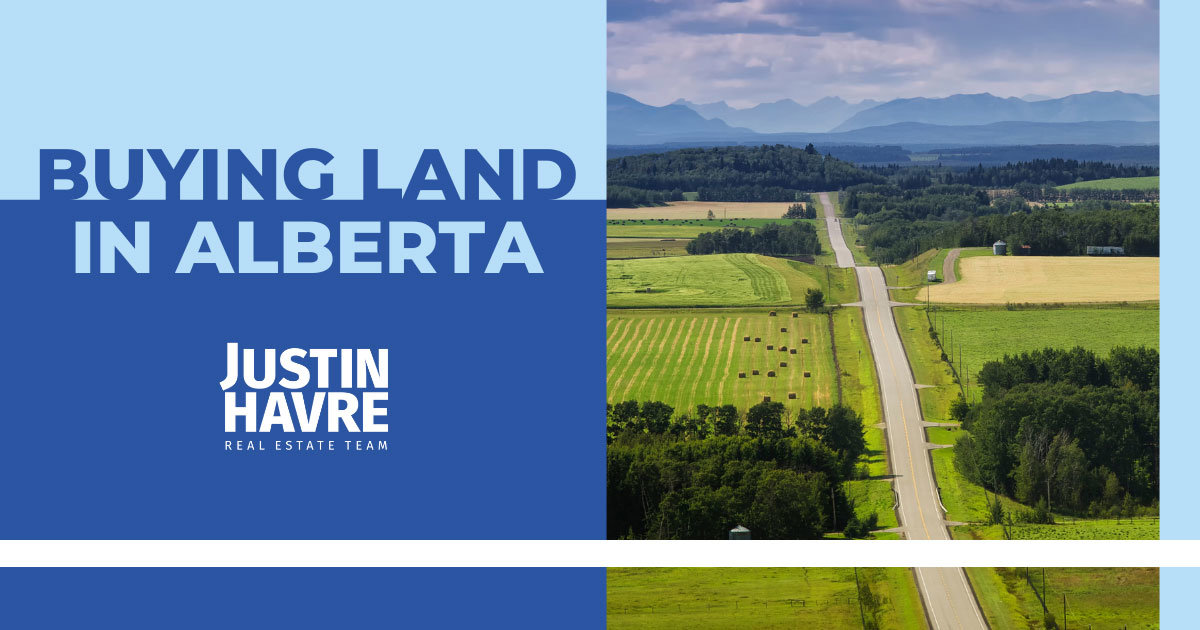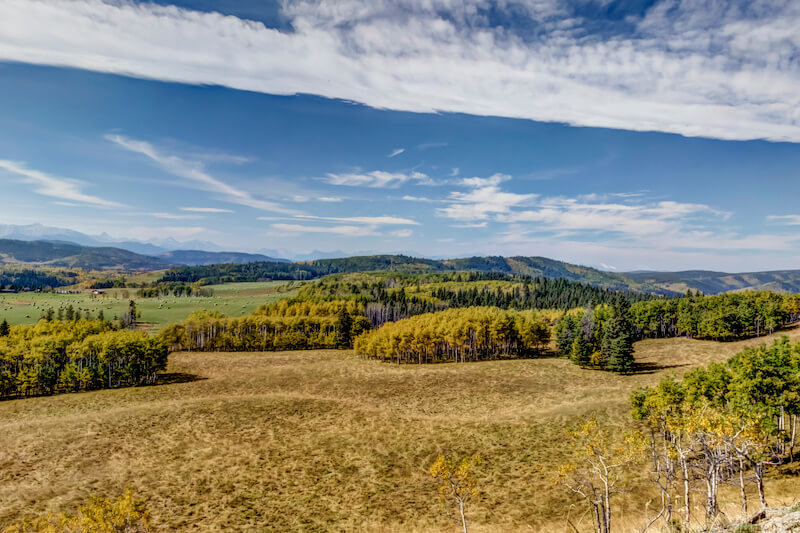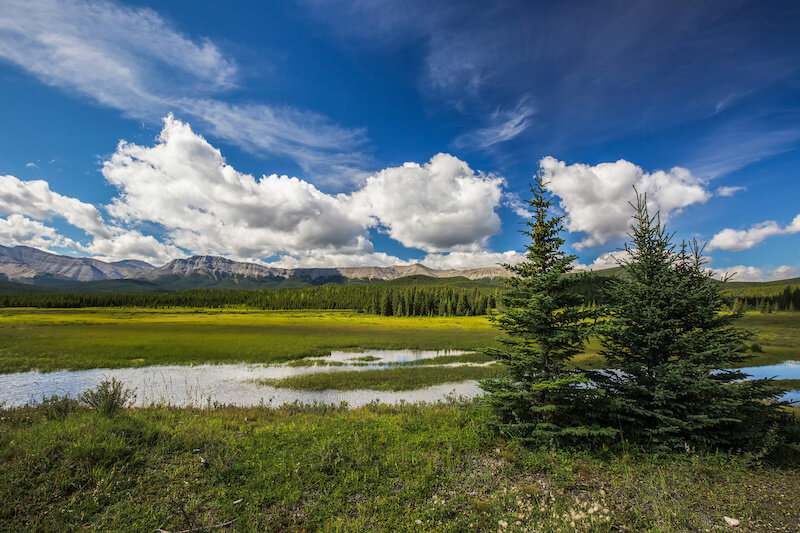
Buying land in Alberta is a big decision that comes with lots of rules to learn. Whether you’re setting out to build your own home or purchasing land as an investment, there’s plenty to understand before signing papers.
From zoning laws to property taxes, let’s look at what matters most when buying Alberta land so you can make a smart choice.
For informational purposes only. Always consult with a licensed real estate professional before proceeding with any real estate transaction.
Quick Land Buying Tips
- Check local zoning rules first—they control what you can build
- Get real numbers on property taxes and extra fees—they add up fast
- Look into environmental rules, especially near protected areas
- Compare city and country land prices—they’re very different
- Think about future value—some areas grow faster than others
- Check with the Alberta Land Titles Office to confirm clear ownership
- Make sure the land has road access and available utilities
- Find out if the land comes with water rights—many don’t
- Learn what permits you’ll need before building anything
- Expect bigger down payments and higher interest rates
Zoning Rules and Land Use
Before buying land in Alberta, find out about zoning. Zoning rules tell you what you can do with your land, how you can build on it, and how you can plan and execute home additions. There are different types, including farmland, housing land, business land, and factory land.
Zoning rules in Calgary can differ from those in Edmonton and Red Deer—each town and city in Alberta has its own rules. Check these rules before buying to make sure the land fits your plans.
Breaking these rules can cost you. You might even have to tear down buildings that don’t follow the rules.
Zoning also covers how far buildings must sit from property lines, how tall they can be, and how many buildings you can have. These rules affect what you can do and how much your land is worth.
Smart buyers always check zoning first. These rules can change your plans or help you spot good chances to make money.
Property Taxes and Other Costs
In Alberta, you’ll pay property taxes based on your land’s value. Tax rates change depending on where you buy, usually between 0.5% and 2.5% of your land’s worth.
The Calgary area, including Calgary, Chestermere, and Airdrie, has some of the lowest property tax rates in Alberta. However, these areas also have some of the highest land costs.
Don’t forget that property taxes also include school taxes that help pay for local schools.
You’ll also pay for town services like garbage pickup, water, and sewer, which add up quickly.
When buying land, budget for other costs too: lawyer fees, Alberta’s Land Title Transfer Fee, and maybe sales taxes. Knowing all these costs helps you avoid surprises later.
Environmental Rules to Know

When buying Alberta land, pay attention to nature rules. The Alberta Land Stewardship Act protects nature while allowing growth. These rules matter most if your land sits near protected areas where you can’t change the landscape much.
Nature reserves protect important resources like water and wildlife, so zoning near these areas limits what you can build or change. Land next to reserves often faces extra rules that might block your plans.
Some lands also fall under the Recreational Access Regulation, which controls how people can use the land for fun activities. Check all these rules before buying to avoid headaches later.
City Land vs. Country Land
City land is close to towns and offers easy access to stores, schools, and hospitals. This makes it great for homes or businesses. However, city land costs more and comes with stricter rules.
Country land usually costs less and gives you more space and privacy. It works well for farming, ranching, or just enjoying nature. There’s also much more of it: acreage in Bearspaw and Strathmore is far more plentiful than in the towns around Calgary or Edmonton.
The downside? You might need to pay extra for water and power.
City land often grows in value faster as more people move in. Country land value grows more slowly but steadily, often tied to farm product prices and outward growth from bigger cities.
Choose based on what matters most to you—convenience or space.
Pros & Cons of Owning Alberta Land
Owning land in Alberta brings both advantages and drawbacks. Zoning laws control what you can do with your property, and environmental rules might limit development.
Always research land use rules and nearby protected areas. The land market offers many choices, from farmland to vacation property, but each type has its own problems, like water access and upkeep costs.
On the good side, Alberta land values have grown steadily over time, often beating inflation. This makes land a solid investment choice. Just know that lenders usually want more up front than typical down payments for houses.
With careful research and planning, you can handle the challenges and enjoy the benefits of owning Alberta land.
Land Title and Ownership Checks
Before buying any land in Alberta, check with the Alberta Land Titles Office. This step is a must. They’ll tell you if the title is clear (no liens or legal fights over the land), who really owns it, and if you’ll have legal access to the property.
Some Alberta land is “landlocked”—meaning you can’t reach it without crossing someone else’s property. You need to know this before buying, not after.
Access and Servicing Reality
Rural land often comes without basic services. Before buying, be sure to get a property survey and confirm:
- Road access (is it a public road or just an easement?)
- Power lines (are they at the property or miles away?)
- Water source (city water or will you need a well?)
- Sewage (city sewer or will you need a septic tank?)
Installing these services yourself can cost tens of thousands of dollars. Get quotes before buying unserviced land.
Water Rights Matter

Just because you own land in Alberta doesn’t mean you own the water on or under it. Water use is controlled by Alberta’s Ministry of Environment and Protected Areas.
You might need a water license to use surface water (like a stream) or even groundwater from a well. Without water rights, your land might be much less useful than you planned.
Building Permits
Even if zoning allows you to build, you’ll still need development permits for construction. The building permit process is separate from zoning rules.
Check with the local county or municipality about:
- Development permit requirements
- Building code standards
- Inspection processes
- Timeline for approvals
It’s common for prospective homeowners deciding to buy or build a house to choose to purchase due to the complexities of zoning and the permitting process. Missing this step can cause expensive delays in your project.
First Nations and Métis Considerations
Some Alberta land sits near or neighbours First Nations reserves or Métis settlements. Before buying, check Alberta’s Map of First Nations Reserves and Métis Settlements. If you’ve already purchased land in one of these areas, talk to Indigenous relations offices first.
Understanding how your land use might affect nearby communities is part of being a good neighbour. This step builds better relationships and prevents problems later.
Financing Raw Land
Getting a loan for empty land is harder than for a house. Here’s what to expect:
- Many banks want a 35%–50% down payment for raw land
- Some lenders won’t finance unserviced or recreational land at all
- Interest rates run 1%–2% higher than house mortgages
- CMHC insurance doesn’t cover vacant land mortgages
Talk to several lenders who specialize in land loans before making an offer.
For informational purposes only. Always consult with a licensed real estate professional before proceeding with any real estate transaction.
Ready to Buy Your Land?
Buying land in Alberta means doing your homework on zoning, taxes, water rights, and financing. City land often offers better appreciation rates, while country land offers acres of space to enjoy.
Think about what matters most to you—investment growth or room to spread out. With good research and planning, you’ll find the perfect piece of Alberta to call your own.